A family from Luhansk, forced to leave their home ten years ago because of the war, found refuge in a small town in the Chernihiv region. “We are now the Bobrovytsya folks,” joke Natalia and Tymur Matkasimov. “This is our home. We won’t go anywhere else from here.”
One day, Nataliya was walking through the streets of Bobrovytsia, carrying freshly baked bread to distribute to those in need, when she received a call from an acquaintance. “Where are you right now? Hide quickly; Russian tanks are driving through the town. They’re not far from you!” There was no fear—only desperation and determination and one clear desire: to confront the enemy and say, “Enough! Go back home. I’ve seen what you bring: sorrow and death. Get out of here!”
***
“When we saw the Ukrainian flag – we got out of the car and cried with happiness…”
“It was incredibly loud… Along the street past our house, a column of Russian vehicles moved. Tanks fired randomly, hitting whatever they could. Missiles and shells flew through the air. Explosions in the city were constant. Then, in a moment of brief silence, my son approached the window and said, ‘Don’t worry, Mom. Only three days left.’ How did he know that? How did he predict it? But three days later, on March 31, the occupiers left Chernihiv Oblast. The trouble they caused… the sorrow they brought to the people… The joy from the liberation news was so overwhelming that my husband and I cried. Marat asked, ‘Mum, why are you crying? Has the war ended?’ – ‘No, son, the war hasn’t ended yet, but the tanks have left the city…'”
Recalling the chilling events of February and March 2022, Natalia cannot hold back her tears. She has lived in the town of Bobrovytsia with her husband and 11-year-old son since April 2014. That was when the war violently shattered her tranquil and happy life, ruthlessly and irreversibly dividing it into “before” and “after.”
Natalia is a professional journalist. She worked in television and served as a press officer in the local prosecutor’s office. Before 2014, she was a successful editor of a city newspaper in Krasnyi Luch, in the Luhansk region. In 2013, she became a mother for the second time. Her husband, a lawyer, worked in the local prosecutor’s office.
“We had everything for happiness: the jobs we loved, a thriving business, a cosy home, even a car. We’d just finished renovating our apartment. Our older children were off at universities. Our greatest joy was our little son, whom my husband and I had eagerly awaited… We had big plans for the future,” Natalia reflects.
“But by the spring of 2014, we already sensed the looming threat of war. At the end of March, my husband turned to me and said, ‘Natalia, war is on the horizon… There’s trouble ahead. We need to safeguard the editorial office.'”
Tymur, a combat veteran from Afghanistan, had worked as a medic. It was during a mission to rescue a wounded comrade that he stepped on a mine, sustaining severe shrapnel wounds to his legs. His lifelong health struggles all go back to that tragic event.
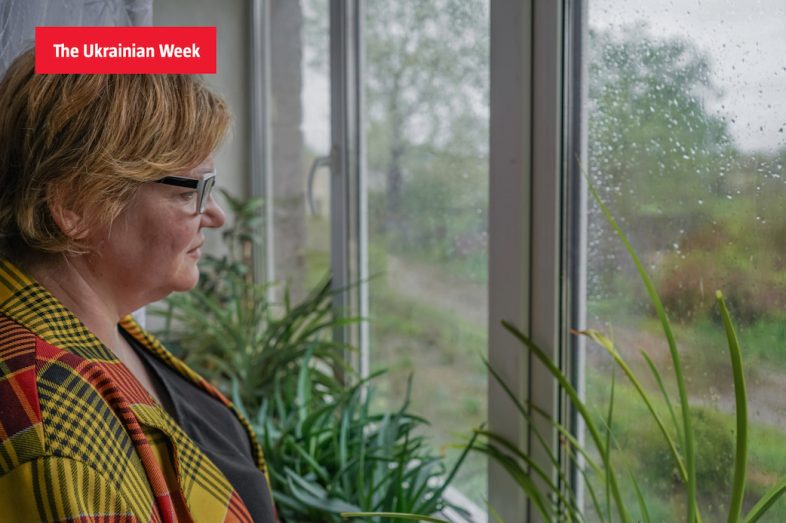
Photo: Yulia Kosynska and Caritas-Spes Ukraine
Following her husband’s advice, Natalia evacuated equipment, machinery, and the newspaper archive from the city. She managed to pay employees’ salaries, cover utility bills for the enterprise, and taxes. However, when it came to retrieving the last issue of the newspaper from the printing house, she faced a daunting obstacle: upon arriving at work one morning, she was greeted by the sight of the Russian flag flying high—the editorial office had been seized by the invading Russian military, transforming it into their headquarters. The latest weekly edition was simply handed out to passersby on the streets. Among other things, it provided readers with advice on how to navigate and safeguard themselves amidst the hostilities.
Staying in the city was no longer an option—it had become too dangerous. Tymur and Natalia grasped the gravity of the situation. With less than a day to prepare, they hastily gathered their essentials: documents and baby food. Accompanied by their small child and Tymur’s ailing 90-year-old mother, they embarked on a gruelling 36-hour journey. Without respite, they navigated through constant dangers, with fields and forested areas already mined, enduring 19 checkpoints along the way, each marked by humiliating inspections and interrogations.
It was only upon reaching the Kharkiv region and catching sight of the Ukrainian flag that they finally stopped the car, overcome with tears of relief and joy.
“And as the grandmothers used to say, ‘May you never know what hunger is, my child…'”
They didn’t just end up in Bobrovytsia in the Chernihiv region by chance. Long-time friends of Natalia’s husband, former Afghan veterans who reside in this town, stepped in to assist. They helped them secure accommodation and provided vital support with groceries and medicines.
“Initially, we thought it would be just a day or two, believing that it would all soon come to an end and we’d return home,” Natalia reflects with a sigh. “We held onto hope that our city in Luhansk region would be liberated from the occupiers.”
Finding work in Bobrovytsia proved challenging. Natalia’s husband was offered a job as a tractor driver, but lacking relevant experience or a driver’s license posed a problem. In reality, even securing employment as a security guard proved to be a daunting task. “At that time, people had different attitudes towards the internally displaced persons… Many looked at them with suspicion: how, they thought, could one leave their home and come to a strange city with nothing? But when it comes to the life and health of your child, you don’t hesitate for long; you leave everything behind just to save them.”
The three-bedroom apartment where we’re sitting now marks the family’s first permanent home, a place where they could finally settle. Before this, for eight years, they lived in rented apartments, each move laden with stress and uncertainty. Just before the full-scale Russian invasion on February 24, 2022, they received an apartment through a state program supporting internally displaced persons and people with disabilities. They undertook extensive repairs themselves; the building, dating back to the 1970s, required updates from walls to windows and doors. The eldest daughter, along with friends and neighbours, pitched in with furniture and belongings.
“On the evening of February 23, 2022, we installed a chandelier in the living room, marking a moment of immense joy as we finally created our cosy corner. However, the following dawn brought a chilling reality as our daughter called from Boryspil: ‘Mom, there’s a war. The rockets are flying over us. There are explosions in the city.’ It felt surreal, like a terrible nightmare. A few days later, Bobrovytsia fell under Russian occupation.”
But it was the onset of full-scale war, unpleasant as it is to admit, that shifted the locals’ attitudes. “They finally understood us,” my interviewee remarks with a bitter smile. They came seeking advice: What do we do now?’ I told them to stock up on food, water, and power banks. Don’t panic. I advised them on how to behave in case of shelling. The war brought us closer together.”
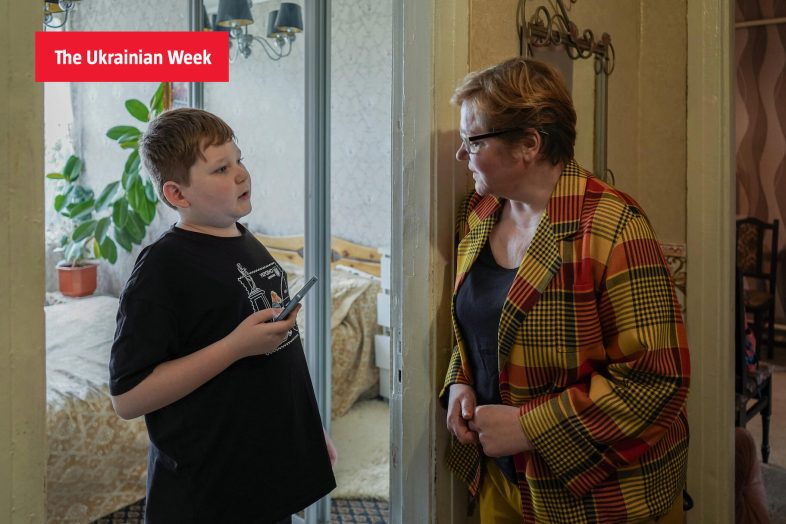
Photo: Yulia Kosynska and Caritas-Spes Ukraine
For a long time, they kept their son in the dark about what was happening. They were determined not to expose his young mind to the trauma of it all. When the explosions grew deafening, they resorted to putting headphones on him and playing music. During bombardments, they sought refuge in the basement.
“Then, out of the blue, my child asked, ‘Mom, what is hunger?'” Natalia recalls. “When the grandmothers in the basement overheard, they couldn’t hold back their tears. ‘Marat, you’ll never know what hunger is!’ they cried out. And then they started bringing us food—buckets of carrots, potatoes, grains, pasta. I’d say, ‘Thank you, but we’re stocked up,’ and they’d reply, ‘God forbid your child ever knows what hunger is…'”
But the most terrifying thing during that time, according to Natalia, was the dwindling supply of medication. Some of the medicines Marat needed were running out, and there was no way to replenish them.
“The happiest day of my life was when our son started talking”
During the city’s siege, internet access was non-existent, and communication was nearly impossible. When electricity finally returned, Natalia, along with other women, took it upon themselves to bake bread and distribute it to those in need—the lonely, the impoverished, and the elderly.
On one occasion, while carrying warm loaves into the city centre, a friend’s urgent call interrupted her: “Where are you right now? Hide quickly. Russian tanks are just around the corner!”
Upon hearing this, Natalia felt a surge of defiance. She wanted to confront them, to stand up to the Russians face-to-face and say, “Enough. I’ve seen what you do. You bring nothing but sorrow and death. Go home! Leave us in peace!” She couldn’t fathom that war had once again caught up with her…
Yet, her son remained her utmost concern. The stresses and traumas he endured in his first year of life had severe repercussions—Marat stopped eating and even forgot how to walk. As he grew older, speech eluded him until the age of five. Countless doctor visits and consultations with specialists left his parents feeling helpless. For the longest time, they grappled with an undetermined diagnosis. When, after extensive and intricate diagnostics, Natalia finally heard the doctors’ diagnosis, it felt as though the ground had crumbled beneath her feet. Autism spectrum disorder—attributed to the stress of conflict. It was, she confesses, the toughest day of her life.
However, the parents refused to give up. They explored various therapy methods, gradually witnessing progress. Doctors offered a glimmer of hope: if they maintained this pace of treatment until their son turned 12 and kept his health stable, there was a chance to overcome the illness. But it wasn’t a straightforward journey. Setbacks in treatment often derailed progress, particularly during acute experiences linked to the war. Whenever the air raid siren blared, their son would erupt into loud screams. Calming him down, stabilizing his condition—demanded both effort and patience.
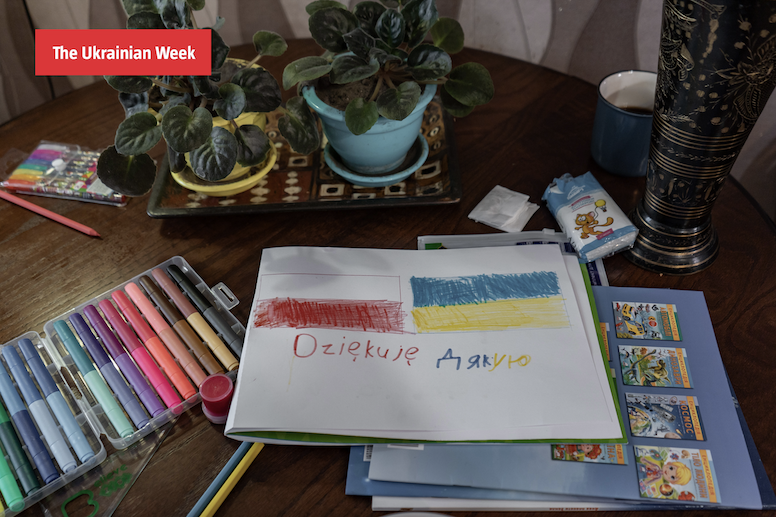
Photo: Yulia Kosynska and Caritas-Spes Ukraine
The bulk of the family’s budget is dedicated to diagnosing and treating their child, making treatment a costly endeavour with perpetual financial strains. In addition to medications, Marat’s gluten-free diet adds a significant burden to their daily expenses. But when their son began to speak… and not just words, but coherent sentences right from the start—that was Natalia’s happiest moment. “I recorded it on video and sent it to relatives and friends: look, our Marat has started speaking; he’s talking!” Natalia recalls. Then, her son said to her, “Mom, I’ve always been able to speak. I just stayed silent because it wasn’t time yet.”
“We don’t need cars, houses, or wealth,” the woman insists. “Our happiness lies in the positive treatment for our son.”
When I heard about this support, it felt like angels had flown to us
Marat is a remarkably talented boy. He has a knack for drawing and playing both the piano and guitar, and he has a passion for creating videos and short films. While he excels academically with an individualised programme at school, he also attends an educational, inclusive centre for special children, a recent addition to their city. However, socialising hasn’t always come easily. The neighbourhood kids, perplexed by Marat’s “unusual behaviour,” used to tease him. One day, Natalia gathered the children in the yard and explained why her son is unique and what it means to be a ‘special child.’ Following this conversation, Marat found many new friends. They not only enjoy playing with him but also stand up for him whenever someone dares to hurt him.
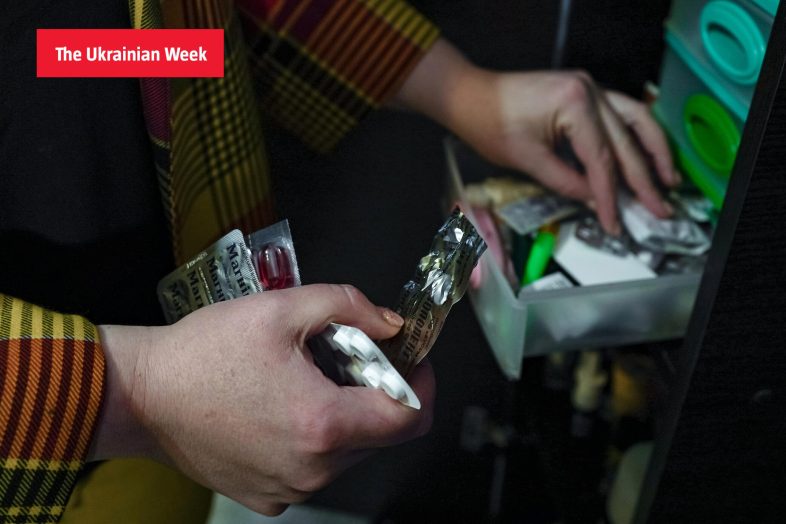
Photo: Yulia Kosynska and Caritas-Spes Ukraine
Looking ahead, Marat dreams of working at a meteorological station when he grows up. He’s currently learning English and is already familiar with countries, their capitals, and national flags. He would love to travel to Europe with his parents after the war ends, with Poland being the first country on his list. “When I told my son that we were accepted into the ‘Family to Family’ project and that ordinary Polish families were aiding Ukrainian families like ours, providing us with the means for planned rehabilitation,” Natalia recounts, “Marat immediately asked, ‘How do you say ‘thank you’ in Polish?’ He promptly noted down the word in his notebook so as not to forget.”
Natalia admits she had never reached out to any charitable foundation for assistance before. She was accustomed to tackling her own challenges independently. However, upon the advice of kind-hearted individuals who were aware of their considerable hardships, she decided to apply for participation in the Polish-Ukrainian project ‘Family to Family’. “It was a trial period,” she reminisces. “We were facing yet another round of rehabilitation for our son, and I realised there was no way we could secure the necessary funds ourselves.” With a modest salary earned as a social educator leading a group of young journalists, Natalia’s primary focus had to be on her son. Meanwhile, her husband, who took on odd jobs, showed little interest in pursuing a more stable, higher-paying position. Balancing the family’s budget was an ongoing challenge.
“What happened when we were accepted into the project felt like a miracle,” Natalia reflects. “I still can’t quite believe that this is happening to us. When we received the first payments, Marat had just undergone a crucial operation. Those funds proved to be lifesaving for us—we immediately put them towards his rehabilitation. Now, thanks to this support, we can afford to take our son for a course of rehabilitative therapy in Truskavets. Yet, it’s not solely about the financial assistance. The fact that our plea wasn’t turned away, that our plight was acknowledged and understood… That’s genuine compassion that helping hand extended precisely when you’re navigating through the darkest of times—it means everything. It’s as though angels have descended upon us and taken their place by our side…”
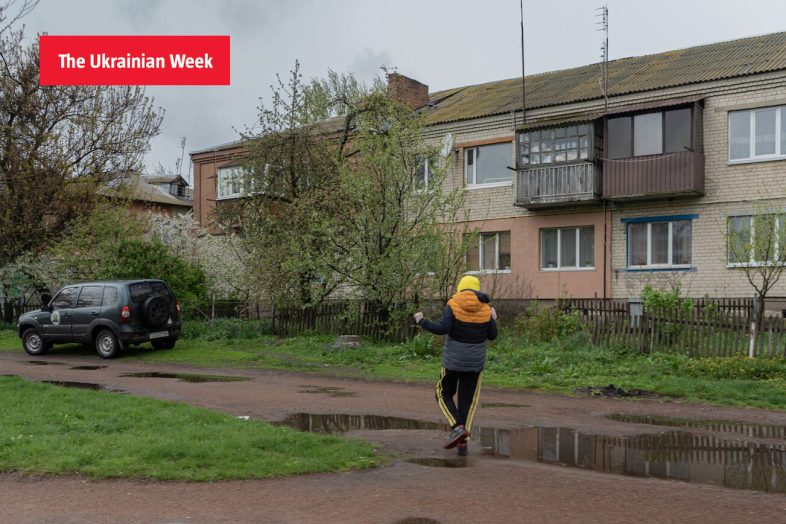
Photo: Yulia Kosynska and Caritas-Spes Ukraine
***
The rain in Bobrovytsia persisted throughout the day without pause. Outside, the sky remained a sombre grey, casting a dim light into the room. However, as Marat and his mother stepped outside to bid us farewell, the weather cleared up miraculously. Despite Natalia’s daffodils and tulips in the flowerbed showing signs of fading, new buds were emerging, promising a fresh start. On the cherry and apricot trees, signs of future fruits hinted at the promise of spring. This year’s early arrival of spring brought reassurance, though its warmth didn’t grace every day.
“What do you dream about the most?” I ask as Marat confidently strides among the puddles. “I want the war to end… I know Ukraine will definitely win, and people will be happy. Because the bravest people in the world live here!”
As we say our goodbyes, Marat hands us a postcard he had drawn before our arrival. “This is for the Polish families. Thank you. Dziękuję!” he repeats in Polish, without consulting his notebook, and flashes a smile.

